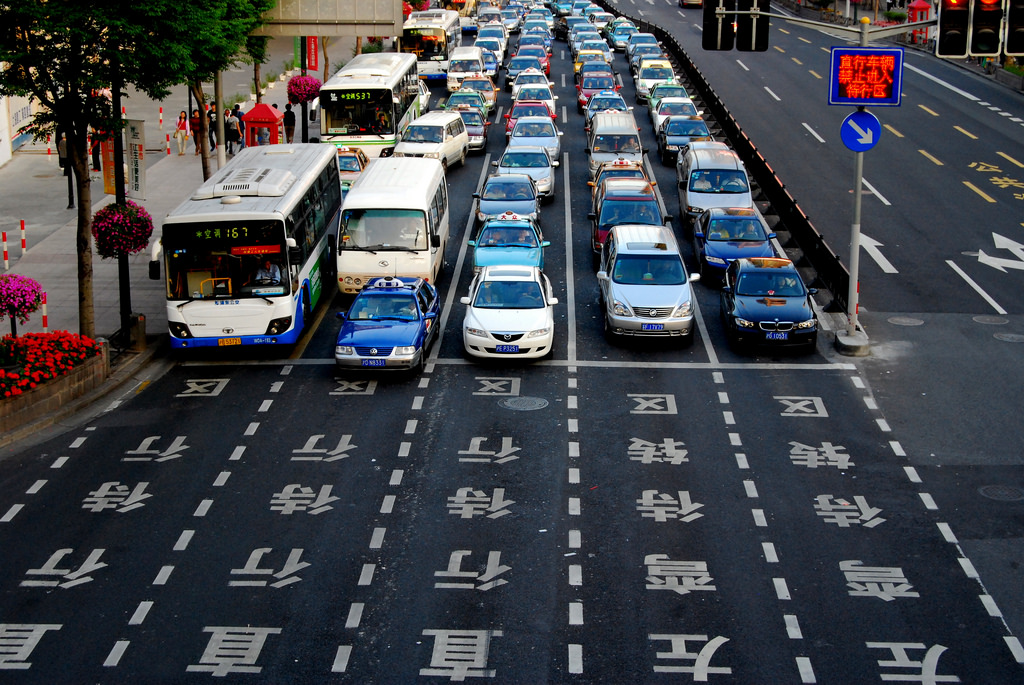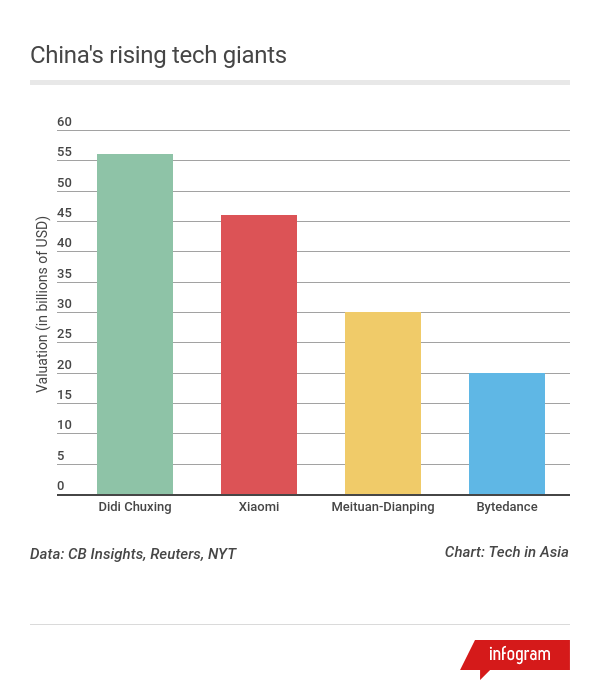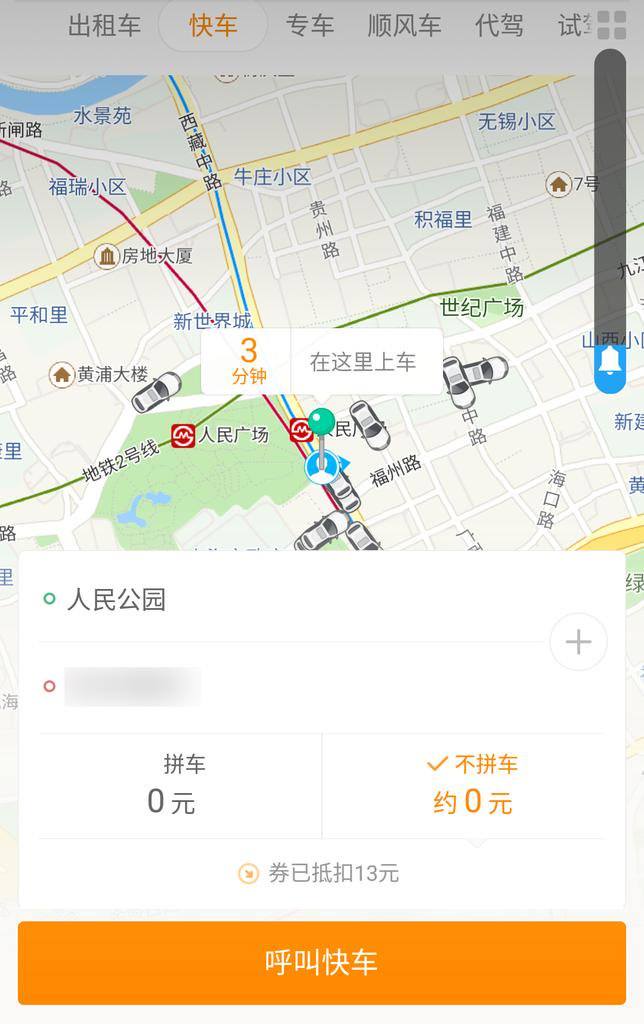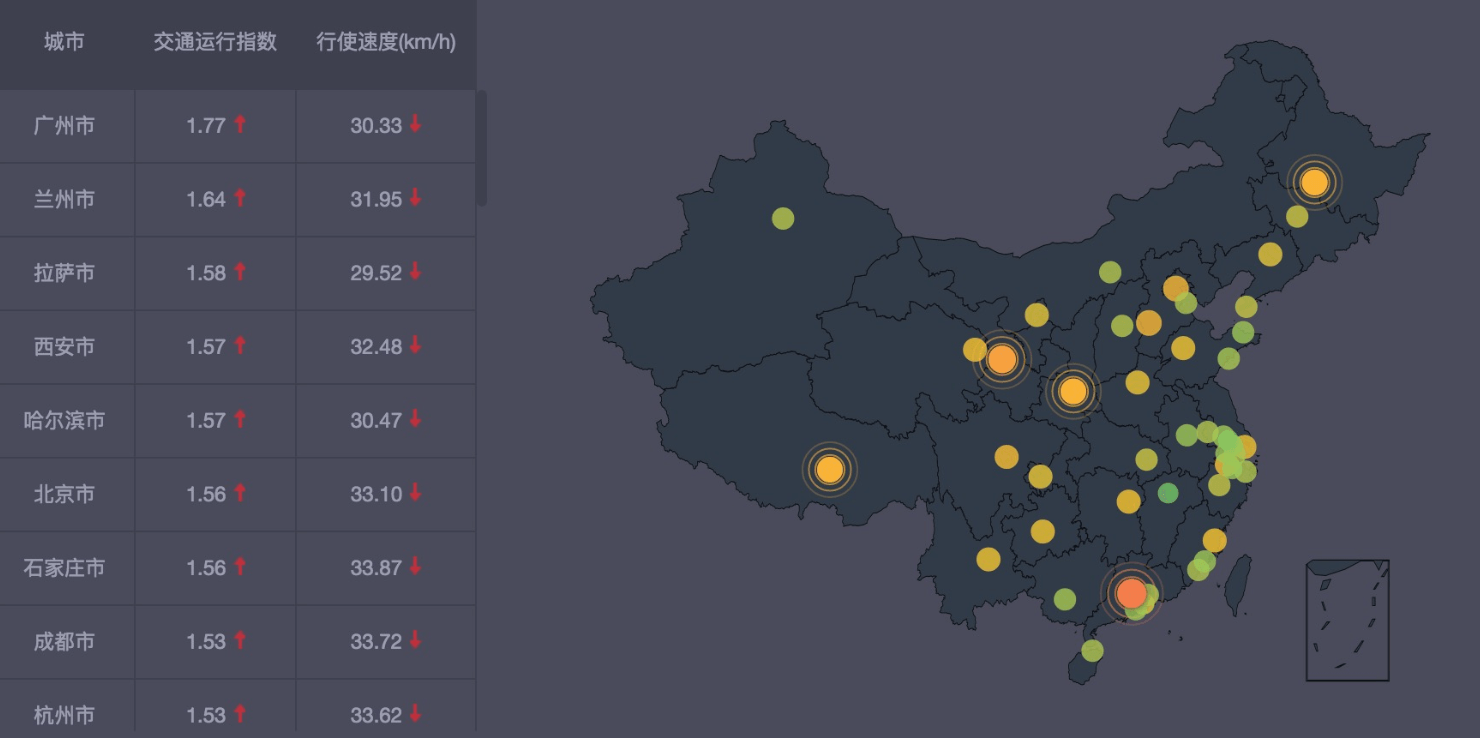
A junction in Shanghai / Photo credit: Carlos ZGZ
In China, where ride-hailing company Didi Chuxing enjoys about 75 percent market share, there’s something new afoot: competition. The challenger? Meituan-Dianping, a startup sometimes known as the ‘Yelp of China.’
At first glance, Meituan-Dianping seems like an unlikely candidate to take on Didi’s stronghold in China – imagine Yelp forming its own ride-hailing unit to compete with Uber. In an interview with Chinese business magazine Caijing, Didi CEO Cheng Wei was openly dismissive of Meituan-Dianping, calling it just another private car service – one among hundreds.
Meituan-Dianping is considered part of China’s next generation of tech giants.
But the online booking platform, which covers food delivery, movie ticketing, travel, and more, is anything but another run-of-the-mill tech company. Like Didi, Meituan-Dianping is considered part of China’s next generation of tech giants, following Baidu, Alibaba, and Tencent. Estimated to be worth about US$30 billion after a US$4 billion round last October, Meituan is also one of the highest-valued startups in the country.
The company also has the ambition to match its capital. According to sources cited in a Reuters report, the Beijing-based company wants to raise at least US$3 billion on the New York Stock Exchange this year. If this pushes through, it would be the largest listing by a Chinese company since Alibaba’s in 2014.

Sometimes called ‘TMD,’ Toutiao (Bytedance’s news aggregation platform), Meituan-Dianping, and Didi Chuxing are considered China’s next tech giants. At a similar valuation is Chinese smartphone maker Xiaomi (Note: The US$45 billion figure comes from Xiaomi’s last funding round in 2014).
In order to reach the heights of Tencent or Alibaba, however, the booking platform will need to find new verticals for growth beyond food delivery – which makes up half its revenue, according to sources at The Information. That explains why Meituan-Dianping ventured into ride-hailing more than a year after Didi acquired Uber’s China unit in 2016.
According to Mo Jia, a Shanghai-based analyst at research firm Canalys, Meituan-Dianping and Ele.me – Baidu’s food-delivery unit – are “about equals” in the sector, so there’s not that much room for new opportunities.
“They must find another area for growth,” he adds.
In particular, ride-hailing could lead Meituan-Dianping to future opportunities in autonomous cars and artificial intelligence, he says. “As 5G rolls out and self-driving cars develop, ride-hailing-esque services will become future applications, so entering the industry early is another consideration for these companies. They’re looking at the long-term development of this industry.”
Subsidies 2.0
To take on Didi’s monopoly, Meituan-Dianping is kickstarting its ride-hailing business with good ol’ subsidies. This year, the company plans to roll out services in seven cities, including Beijing and Shanghai. The move comes after launching in Nanjing last October.
Meituan-Dianping is also offering drivers low commission fees – as low as under a dollar – for the first three months. This strategy targets one of the largest pain points of Didi drivers. A few drivers that Tech in Asia spoke to claimed that they lost as much as 25 percent of ride profits to the platform. For long distances, some drivers will even ask passengers to pay them directly to circumvent fees.
Rewards are one thing, but we’re mainly worried about there not being enough passengers.
Didi declined to confirm or comment on its platform commission fee.
“We’re looking forward to [Meituan-Dianping’s ride-hailing service] even more than you passengers,” shares Wang, a part-time Didi driver in Beijing who declined to give his full name. He also says that sometimes, it’s simply not worth driving after you factor in gas prices and platform fees – especially if it takes you longer to pick up passengers than to deliver them to their destination.
Other drivers, however, are more cautious. “Rewards are one thing, but we’re mainly worried about there not being enough passengers,” explains Yue Quanhu, who started driving for Didi three months ago after giving up his fruit-selling business.
“We’re willing to try [Meituan-Dianping], but of course, you need to consider your future finances before you jump ship.”

Thanks to competition between Uber China and Didi, you could hail rides for free in 2016. / Photo credit: Eva Xiao
Meituan-Dianping says it won’t rely on subsidies for long-term growth. As such, it plans to leverage the traffic from its app, which has 250 million daily active users, according to company data. Passengers will be able to access its ride-hailing service directly through its lifestyle services app.
“We discovered that after searching for restaurants [in our app], users will click on our map feature to see where they are,” a Meituan-Dianping spokesperson tells Tech in Asia. Many of them will then search for ‘ride-hailing,’ she explains, which prompted the company to explore the vertical.
Meituan-Dianping is partnering with Tencent for mapping services, as the former can provide data on food and beverage establishments. Tencent is an investor in both Meituan-Dianping and Didi, which is also backed by Alibaba and its affiliate, Ant Financial.
Meituan-Dianping’s spokesperson says the company’s attitude to Didi’s ride-hailing business is “very open.” She continues, “We’ve actually connected with Didi before, but at the moment, we decided to try it ourselves first.”
Regulatory hurdles
To be sure, Didi Chuxing has an enormous head start over Meituan-Dianping. It will be an uphill battle for the booking platform to take market share away from Didi’s core business.
Meituan-Dianping reportedly processes more than 100,000 daily orders in Nanjing, its inaugural ride-hailing city. That seems plenty until you compare it Didi’s platform, which facilitated more than 7 billion rides in 2017. And after defeating two domestic competitors via acquisition and merger, Didi is at the point where it can invest in big data and AI research to make use of all the data generated on its platform.
“Our data capabilities put us at the forefront of the industry. We will be able to deliver better services to users in China and abroad at an accelerated pace,” a Didi spokesperson tells Tech in Asia, in response to the competition posed by Meituan-Dianping.
With a solid base in China, Didi is also aggressively expanding abroad. In January, the transportation company announced it acquired 99, its Brazilian equivalent. To go up against Uber, Beijing-based Didi has also formed alliances overseas with Lyft in the US, Ola in India, and Grab in Southeast Asia.

Didi’s traffic dashboard shows the real-time Travel Time Index of different cities, a metric that reflects how bad a city’s traffic is. / Photo credit: Didi Chuxing
Lastly, Didi has weathered several rounds of regulatory changes around ride-hailing in China – a barrier that Meituan-Dianping now faces as an industry newcomer. It has to pay closer attention to authorities as it expands across China, unlike Didi, which entered the market before policies were defined.
“After the new policies were enacted last year, private car services in the ride-hailing industry face much higher barriers now,” explains Canalys analyst Mo. Additionally, he expects that Didi will “definitely” take the bait if Meituan-Dianping wants to start a price war, citing how ride-hailing was the making of Didi.
In the end, it’s another round of cash burning, and users will benefit.
“In the end, it’s another round of cash burning, and users will benefit,” he concludes.
Last week, Meituan-Dianping had to hold off on its Beijing launch because it failed to obtain the relevant ride-hailing licenses, according to Chinese media. Meituan-Dianping declined to comment on the reason for the delay, and did not provide a new timeline for its Beijing roll-out.
The booking platform isn’t the only tech firm eying Didi’s turf in the broader transportation market. Bike-rental unicorn Mobike – also backed by Tencent – announced a car-sharing pilot in Guizhou last December, a new Zipcar-like service called “Mocar.”
Meanwhile, Didi is also planning to enter the bike-sharing industry with its own branded bike-rental service, plus a larger, deposit-free bike rental platform that includes partners like Ofo and cash-strapped Bluegogo. The latter gave up its operations to a Sichuan bike-sharing company last November.
Currency converted from Chinese yuan. Rate = US$1 = RMB 6.44.
This post China’s ride-hailing wars are back appeared first on Tech in Asia.
from Tech in Asia https://www.techinasia.com/didi-meituan-dianping-ride-hailing-war
via IFTTT
No comments:
Post a Comment